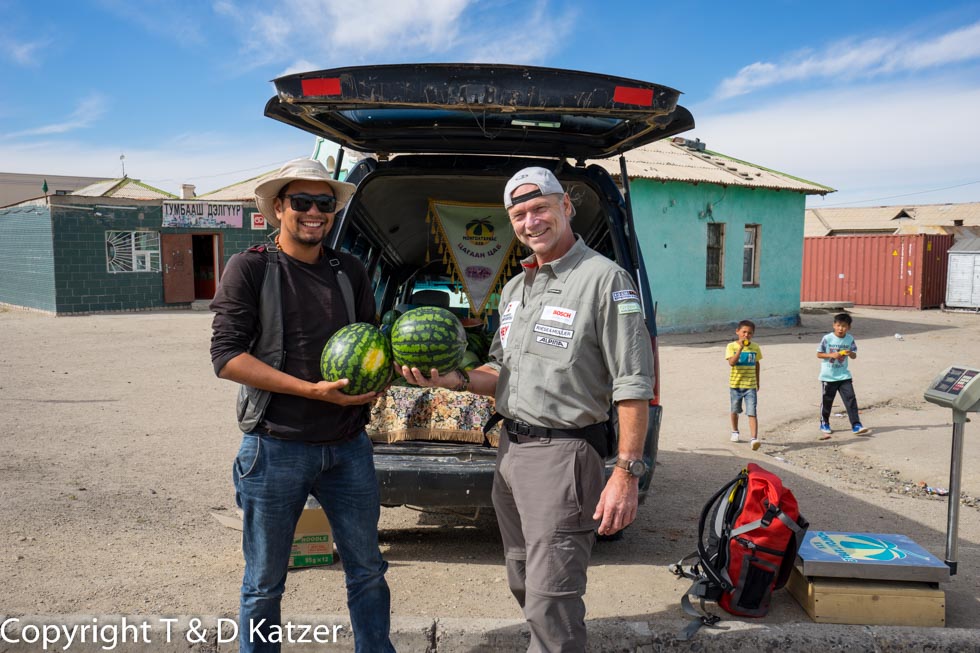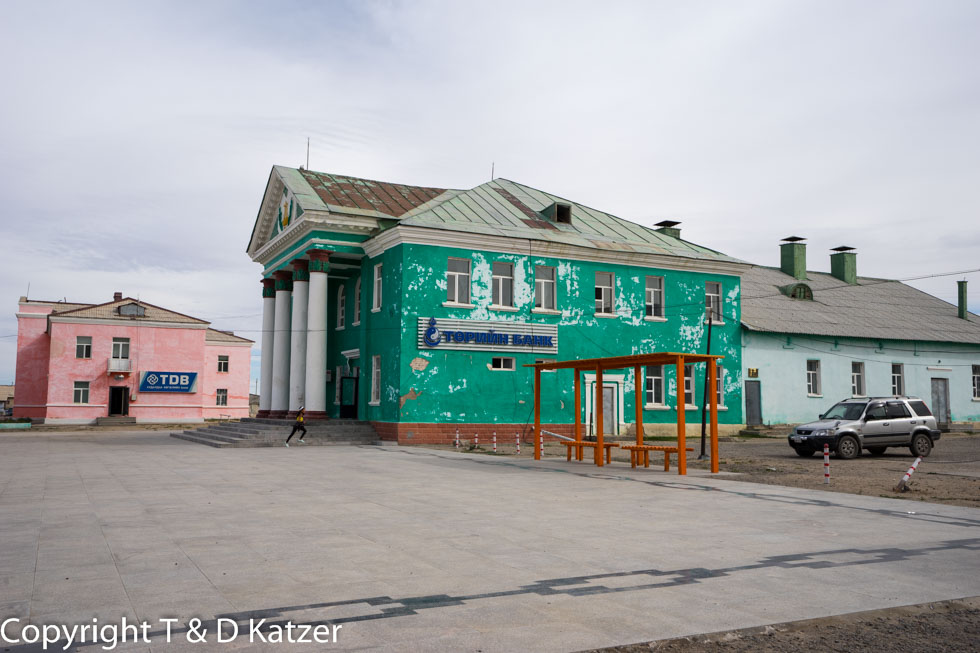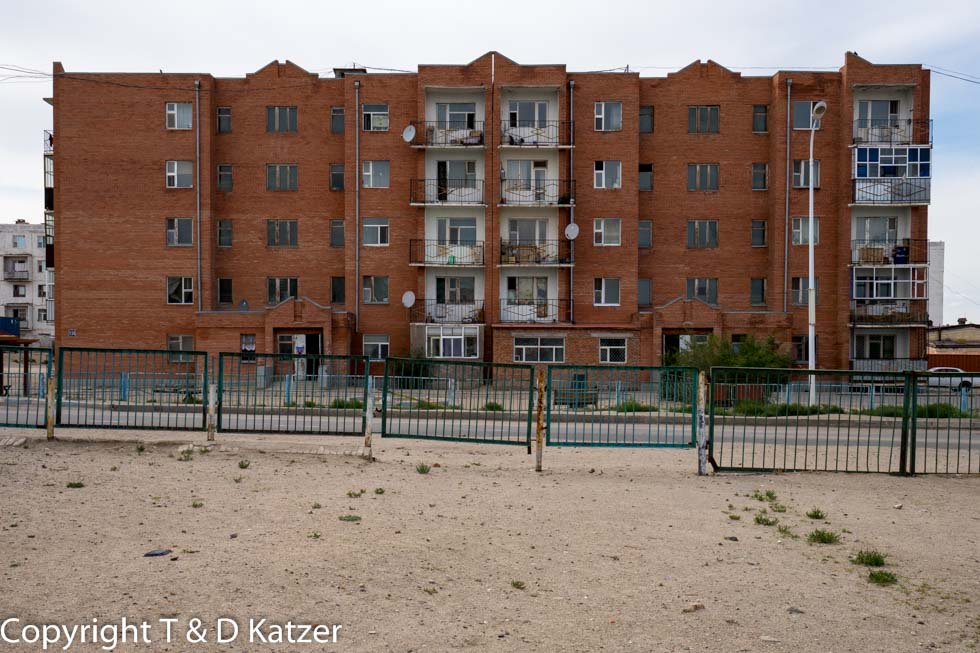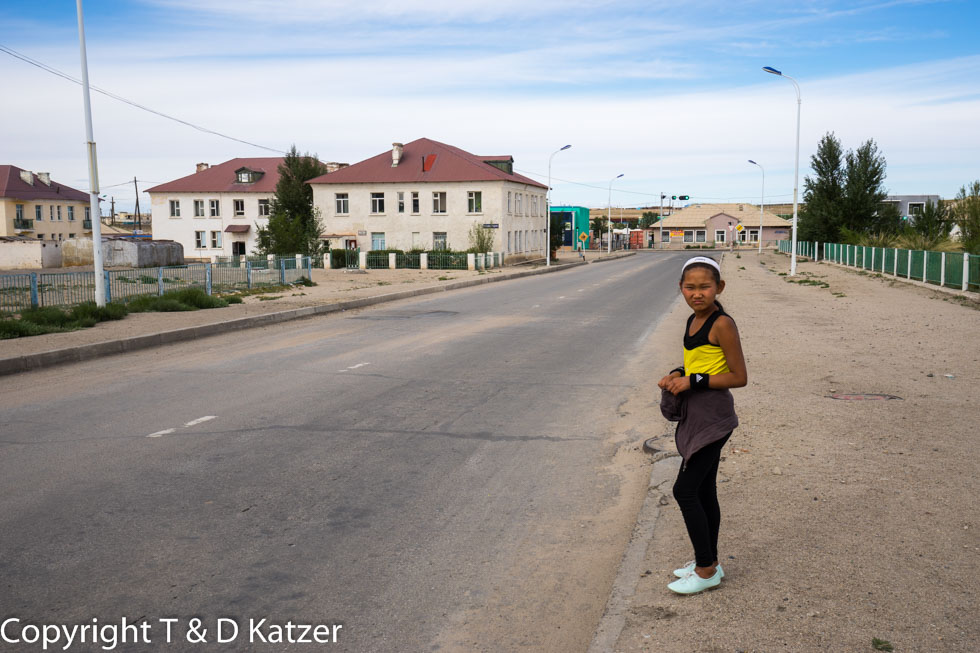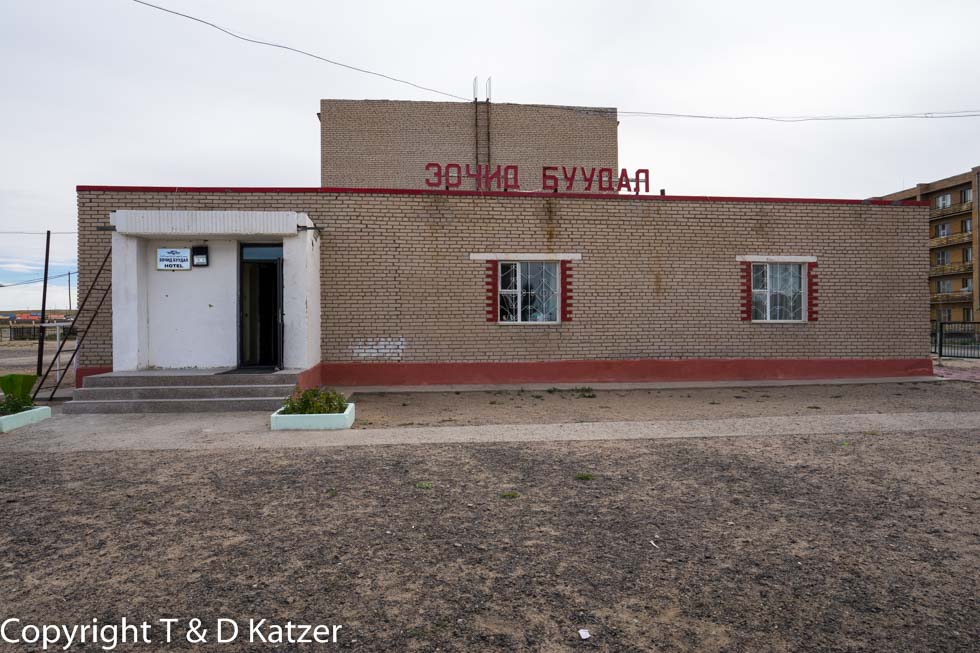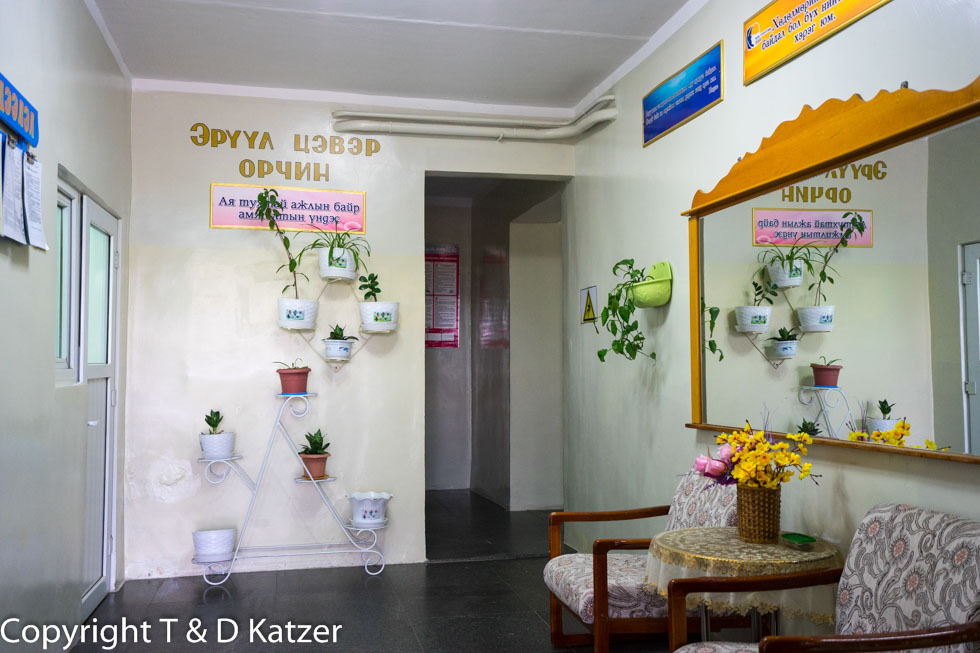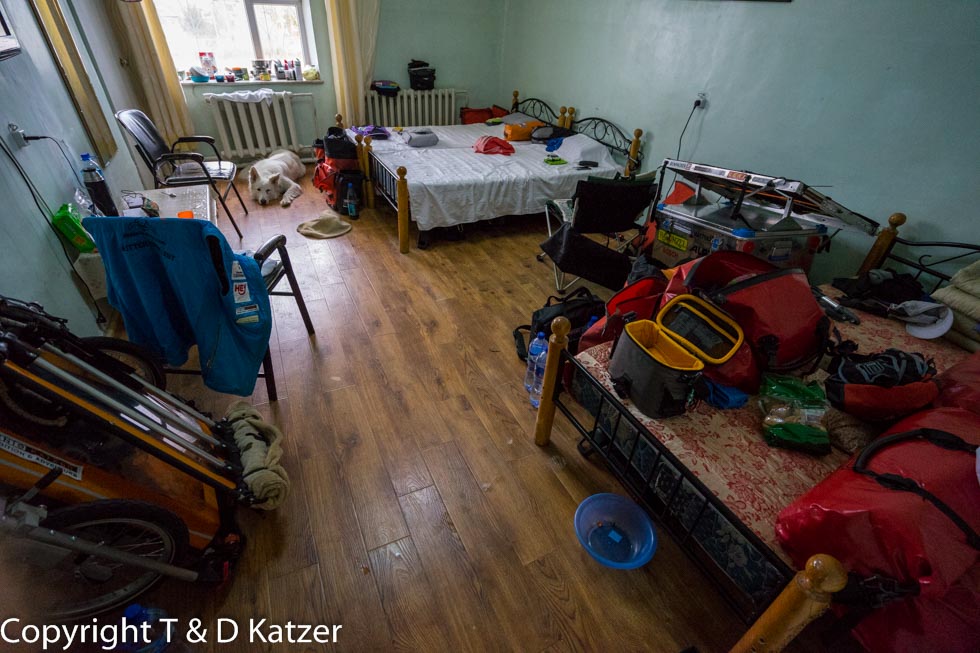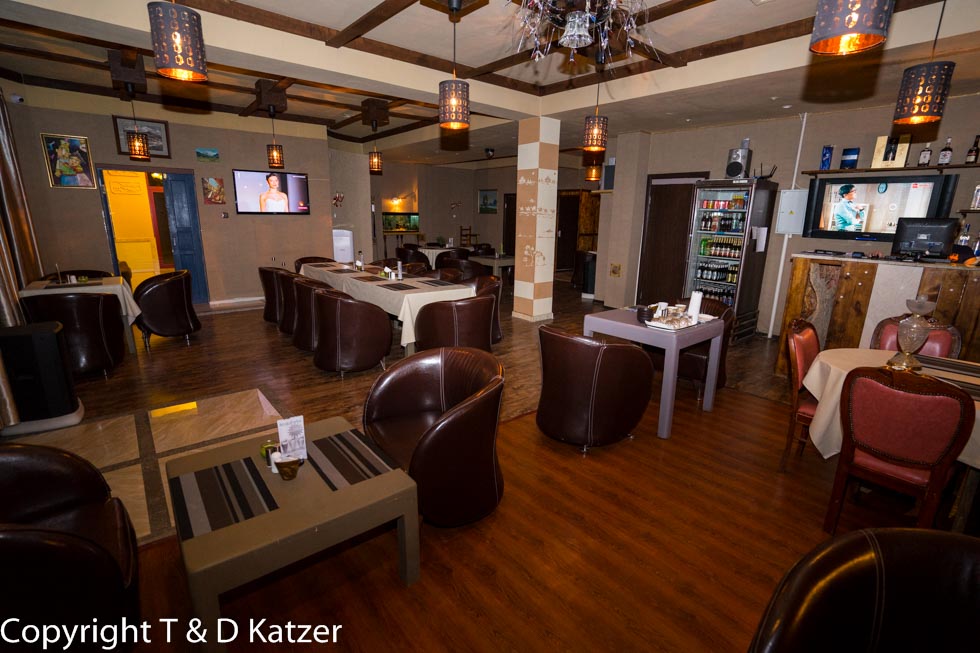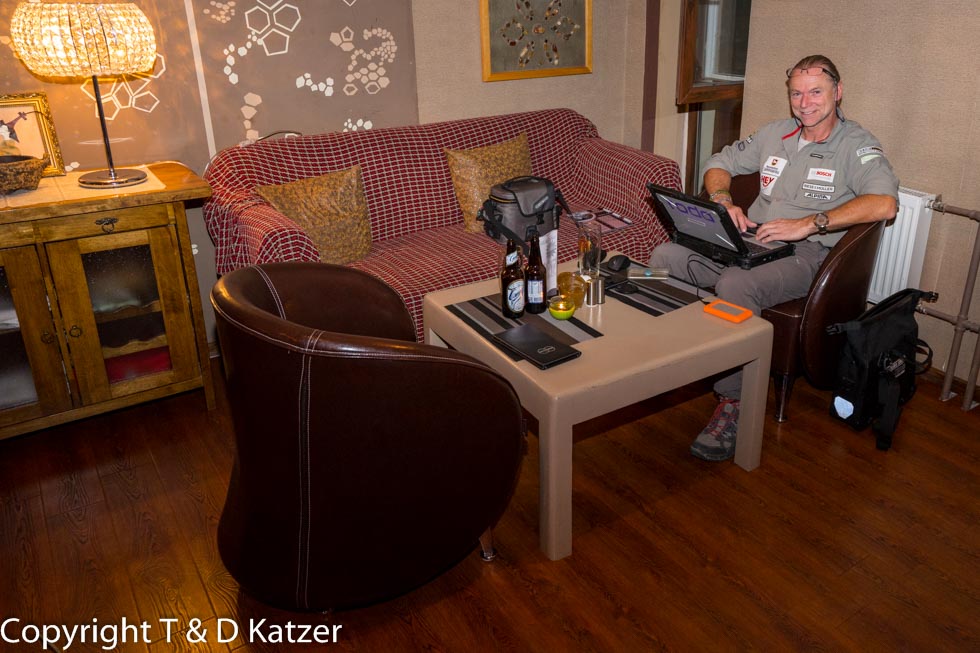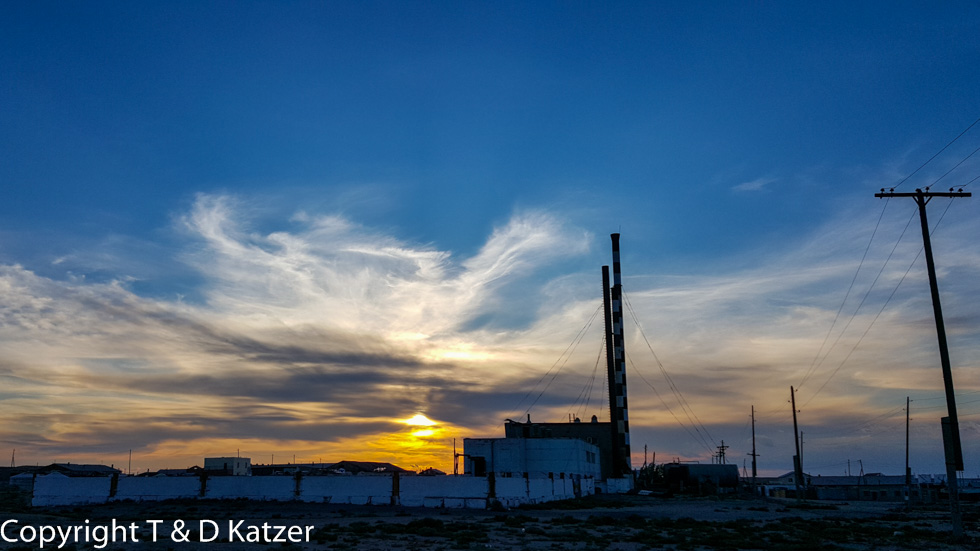
Reported to the police and planning for desert crossing
N 44°54'32.2'' E 110°08'16.2''
Date:
06.09.2015 to 10.09.2015
Day: 70 – 74
Country:
Mongolia
Location:
Saischand
Latitude N:
44°54’32.2”
Longitude E:
110°08’16.2”
Total kilometers:
9,151 km
Maximum height:
1.000 m
Total altitude meters:
4.010 m
Sunrise:
07:05 am to 07:10 am
Sunset:
8:10 p.m. to 8:02 p.m.
Temperature day max:
25 °C
Temperature day min:
14 °C
Total plate tires:
4
Plate front tire:
1
Flat rear tire:
2
Plate trailer tire:
1
(Photos of the diary entry can be found at the end of the text).
In the morning we wake up in the spartanly furnished room. The heating and water pipes laid over the plaster are as noisy as in a power station. The loud voices in the corridor echo into our room in such a way that you could be forgiven for thinking we were in a train station or a gym. We can only shower in the evening because during the day ice-cold water drips through the pipes and we need a few minutes to lock the room door because the lock is broken. Oh how I’ve grown tired of these rooms. But what the heck, that’s a small price to pay for the traveling life and if there are only such trifles to complain about, Tanja and I are the happiest people in the world.
I use the morning to repair the three flat inner tubes. I was sold a quick-fix kit for this in Germany. In fact, I am delighted with this method of just sticking a self-adhesive patch on the hole without having to smear glue on the surface as I used to. However, after I let the air out of the hose again, the patch shrinks so much that it partially comes off. Even after several attempts, I get the same result. Fortunately, I also got some conventional repair kit. And lo and behold, it works perfectly. However, I have to realize that the glue tube in the brand new box is almost empty. “What’s wrong?” asks Tanja as I grumble quietly to myself. “You won’t believe it, but they sold me some kind of quick-fix kit that doesn’t work, plus some old repair kit. There’s almost nothing in the tube of glue except a lot of air.” “And is that bad?” “Well, whatever you say. We only have one puncture repair kit left and we certainly won’t be able to buy any here in Sainschand. That means we won’t get the stuff until we get to China at the earliest,” I explain. “What if we get more flat tires on the way there?” “Then we’ll have a serious problem,” I say thoughtfully and because there’s nothing I can do about it at the moment, I inspect our dog trailer. “Oh dear. The drawbar doesn’t look good. It’s bent even more. Now it’s really time to get to China to get some spare parts. I just hope we can have something sent to us from Germany,” I say as there’s a knock on the door. “Möngö”, demands the woman in charge of the rooms in the morning. Tanja hands her the agreed 40,000 Tugrik. (€ 17.92) “I get 45,000 Tugrik”, (€ 20.16) she says seriously. As many Mongolian hotels and guesthouses have several women sharing the job, they work in shifts. This means that every day or every other day a different employee is responsible for welcoming guests, cashiering and cleaning the rooms. This morning, a new woman demands the money again without knowing about the agreement with her colleague. After Tanja kindly explains everything to her, we pay the 40,000 Tugrik again and get a receipt for it, just like yesterday. The next morning the annoying game is repeated when a woman we don’t know asks for 45,000 Tugrik again. This time Tanja tries in vain to explain the agreement. “I get 45,000 tugrik,” she says sharply. “I won’t pay more than 40,000 tugrik. That’s what we agreed,” Tanja remains adamant and shows the young bill collector the two receipts from the previous days as proof. When she becomes even more unfriendly, Tanja closes the door. Five minutes later, there was an aggressive knock. Now a lady in uniform is standing in front of us. “You have to pay 45,000 Tugrik per night!” she demands imperiously, as if we were criminals. Again Tanja explains that we have an agreement for a special price because we want to stay at least four days. “I don’t care about that. You pay 45,000 tugrik right now. I’m an engineer! Look!” she shouts, pointing to her epaulettes. “I’m a journalist and I don’t care what they are!” replies Tanja, and things slowly come to a head. So far I’ve stayed out of the discussion, but after this stupid nut shouts at Tanja, I shout back. “Stay out of it. That’s probably better,” says Tanja after she sees me start to shake with rage all over my body. Tanja explains the case again with the tongues of an angel and points to the receipts. The engineer doesn’t give in and now she also says that we are not allowed to bring a dog into the house. The ladies then retire to deliberate and discuss loudly, their voices echoing from wall to wall. Meanwhile, we close our door again when, after a while, there is another heavy knock. “Denis, you won’t believe it. Now they’ve called the police,” says Tanja. “What?” I ask in dismay. “Yes, look, there’s a policeman at the door,” she says and tries to talk to him. “The passports,” he demands gruffly, whereupon we hand them to him. With a sour look on his face, he leafs through our documents looking for the visas. Stunned, I sit in my folding chair and can’t believe that the ladies of the house have reported us to the police, even though they know exactly what the agreement was. The officer wants to go into our room but Tanja gently pushes him out again and says: “We can discuss this outside the door.” Now that the policeman has also taken a look at the receipts, the tide seems to turn in the short term. He asks the ladies, who are obviously accusing us of a crime, what this is all about. Now the employee who gave us the special price is standing in the corridor of the accommodation. She was informed and rushed here from home. She is close to crying. Apparently, she exceeded her authority with the special prize. Tanja learns that she will now have to pay the difference if we don’t give in. To avoid adding fuel to the fire and because Tanja feels sorry for the woman, she says: “Okay, we’ll pay the 45,000 Tugrik and they’ll also get the 5,000 Tugrik from the last two days retroactively. Everyone should be happy with that, right?” Before anyone can say anything back, she shakes hands first with the policeman and then with each of the ladies, including the stupid engineer. “We are all friends. Germany and Mongolia are friends,” she says and laughs, to which everyone present joins in her laughter with relief. “And to make sure they’re completely satisfied, we’ll leave tomorrow,” Tanja suggests, which is why the Mongolian woman who gave us the special prize looks down to the ground in shame. Tanja then says goodbye to the assembled team and closes the door.
“Wow, that was perfect, quick and clever de-escalation work,” I praise Tanja as she sinks into a chair next to me. “It wouldn’t have done any good to remain unyielding. In the end, we would have had to go to police headquarters and who knows what would have happened there. Apart from that, we are in an extremely corrupt country. Everyone knows everyone here. Nothing good would have come of it, at least not for us,” I think. “Well, the main reason I gave in was the woman who had given us the special price. I just felt sorry for her. She would certainly have had to pay the bill and who knows, she might even have lost her job. And all because of the few Turgik.” “It’s not about the tugrik, it’s about the law and perhaps also a bit about principle. But what the hell, law and principle, especially false pride, won’t get us anywhere,” I say.
“And now we have to move on tomorrow. Are we ready for that? Have you repaired everything you need?” Tanja wants to know. “I need to check a few little things on the bikes. But that won’t take long. According to the maps.me program, it’s only about 60 km to the next village. Then there’s a settlement another 60 km away. And the Mongolian-Chinese border is only 100 km away from there. It looks like the distances are no problem for our loading situation. So we can set off tomorrow,” I explain. “Maybe it’s good to get to the border earlier than planned? You never know if there will be unforeseen events,” answers Tanja. But I feel inexplicably insecure because of the tiresome room dispute. An inner voice literally tells me to call the Dutchman Roelof and ask him about the route in addition to my map information. As he has been driving through the country with his tourists for years, he can certainly tell us something about the route ahead of us. Better safe than sorry,” I say and immediately dial the phone number. “Hi Roelof, hope everything’s going well for you?” I greet him as he answers his cell phone. We talk for a while about the country and what has happened in the meantime. Then I ask him about the highway from Sainshand to China. “Well, you won’t be able to recharge anywhere. There is not a single town or accommodation on the entire 230 km route. The towns indicated on maps.me are many kilometers away from the road. You can only see this if you zoom in on the map on your phone. Also, the towns can only be reached via clay and gravel roads,” his statement sobers me up. “Are you sure about that?” I ask again. “Absolutely. I know this part of the country like the back of my hand. I have to go to China every few months to apply for a new visa for Mongolia.” It takes me a while to get over this statement. “It’s not our day somehow”, I say, pondering how we are supposed to manage 230 km under our own steam. “I don’t see it that way. If we hadn’t had the incident with the engineer, you wouldn’t have called Roelof. I think we would have relied on the maps.me and would have been left stranded, with too little water and food supplies. That would even have jeopardized our China visa.” “Well, we should thank the stupid engineer then,” I say with a grin. “Maybe?” “Well, it always depends on how you look at things,” I agree with Tanja.
During the afternoon, we discuss our options for reaching the border. On the route from Siberia to this small town so far, there have always been enough charging options and now, on the final distance to China, an almost unsolvable problem seems to be building up. We decide to drive in Ecomode throughout. We are making slow progress with this, but we could make it. To get even more certainty, I go to see Roman, the melon seller. “Do you know if there’s a petrol station or accommodation from here to the border?” I ask him. “If anyone knows, it’s my father,” he says and calls him immediately. I find out that there is a petrol station after about 90 km. “Is that a reliable statement?” I ask. “Absolutely. If my father says so, it’s true. He goes to China once a month to do business there,” he says and gives me another watermelon.
In the evening I call Khadbaatar, the owner of the construction company in Ulan Bator, and ask him if he has any ideas about the challenge ahead of us. “I’ll take care of it and get back to you,” he promises. An hour after our conversation, he calls back and suggests that we drive to the Mongolian Railway’s trackside cabins. “They come every 20 km and there’s electricity there too,” he says, to which we are relieved to have found a simple solution after all. However, the joy doesn’t last long, because when the cell phone rings again, Khadbaatar explains to me that the track is sometimes many kilometres away from the road. “You have to follow the single track on the clay and sand tracks. That’s the only way to get to the track houses,” he recommends. “230 km of clay and sand tracks? And what if it rains like this again? Then we’ll sink into the mud and they can dig us up as fossils in a few millennia. Above all, what if we break down? Even in an emergency, we won’t be able to stop a car and ask for help. I don’t know if this idea is more of a shot in the foot,” I ask myself. Without knowing how to get to the Chinese border, it wouldn’t be good to leave tomorrow. We overcome our pride and ask the ladies of the house if we can stay longer with our dog after all. Of course, under the condition that they want to pay 45,000 Tugrik. You are in favorable agreement.
Since we’ve been back in Sainshand, we’ve been going to the posh hotel every evening, where they wanted to put our dog on a chain and our bikes behind a wooden fence. The reason for this is the WLAN, which we need to be able to post our texts and images on the website and Facebook. So we sit down in the comfortable armchairs, drink a beer or two and write until they throw us out or we walk tiredly to our government accommodation before then. We are usually the only guests. Sometimes a few well-heeled Mongolians come to get mercilessly drunk, but sometimes there are also families in the restaurant to have something to eat. We look up as two Europeans suddenly enter the hotel restaurant to enquire about the menu. As the couple are about to leave, Peter approaches us. We talk a little about our trip and learn that Katharina and Peter are traveling with their two daughters and a dog in their motorhome from Germany to Southeast Asia and back. “How long will you be on the road?” I ask with interest. “One year,” is the astonishing answer. “And that with your eight and twelve-year-old daughters?” asks Tanja. “Yes, we have deregistered her from school. We will move to Austria after our trip and register her there again. That’s why it’s possible to go on such a long trip,” explains Katharina. “Fantastic. I think these will be the best, most instructive, most beautiful and most unforgettable years for your children,” I say. “Did I get that right? You have a dog with you?” asks Tanja, changing the subject. “Yes.” “And how are you going to get it across the border?” “We don’t know yet. Our tour guide Mrs. Spring said she’ll do everything in her power to get the dogs across the border.” “The dogs?” I interrupt, not sure I’ve misheard. “Yes, another couple from Germany is also traveling to China with their dog. In total, we are five motorhomes from Germany, Austria and England. Because cars are only allowed to travel through China as a guided tour, we all booked a tour together,” explains Peter. “Sounds interesting. How did you find each other?” “Via the internet,” answers Katharina. “And how much does a guided tour cost?” “3,000 US dollars.” “For everyone together?” “That would be great. The price is per vehicle.”
“We also travel with our dog,” Tanja changes the subject again. “We’ve been told that he has to go into quarantine for a month. There seems to be no other option. We’ve tried everything so far but have had no success. In the worst case, we’ll have to spend a month in the border town of Erenhot and wait until they release our Ajaci again. But somehow I am confident that we will find an easier way,” she says. “What are you going to do in that case? Surely you can’t wait a month with a tour group?” I ask. “Then we have to drive all the way back through Mongolia to Siberia. There we’ll try to embark for Asia via Vladivostok,” explains Peter. “Well, that would be a long and expensive detour,” I reply.
We continue to talk animatedly about the traveling life when Peter asks; “We are much too early to travel to China already. Do you know what to see in this area?” “Of course I do. Khamariin Khiid is absolutely worth seeing. You’ll need two days at most. But why can’t you cross the border now?” I ask. “We have agreed with the others to meet on September 14 in front of the border and then drive to China together. If something goes wrong, our last chance to enter the country is on September 17. “It’s crazy, we also have to cross the border on September 17 at the latest. Who knows? Maybe we’ll meet there. It’s a small world, especially when you have to cross the same Chinese border at the same time,” I say with a laugh.
Later, as we walk back to our accommodation, we see Katharina and Peter’s motorhome, which is about eight meters long, in the hotel parking lot. “It’s not a motorhome, it’s a house on wheels,” I say. “It can also be great to travel in such a luxurious way,” says Tanja. “We’ll do that when we’re old,” I reply, but would rather swap places with the family now so that we don’t have to stay in our uncomfortable accommodation. The next day we write Katharina and Peter an email to ask if they could scout the route from here to the border for a gas station or accommodation for us. Perhaps there will be an unforeseen charging opportunity for us after all. “Do you mean they answer?” I ask Tanja. “I have no idea. But I could imagine.”
The next afternoon, my cell phone rings. “Hello Denis. This is Peter. We met at the hotel two days ago,” he says. “Hope you enjoyed Khamariin Khiid?” “It’s an interesting place. I wanted to offer to charge your batteries on your first day of travel. I’m sure you’ll make it to the border on that,” he says, at which point the phone almost falls out of my hand. “You really want to charge our batteries? Do you have a generator in the motorhome?” “Of course I have a generator and we would be happy to help you. As I said, we still have plenty of time. We can charge your batteries before I wait for the others at the border. But let’s talk about the details later. Can we meet you at the hotel at 19:00? Where we saw each other for the first time?” “Of course we can. I’m looking forward to it,” I reply.
After dinner together, we can hardly believe our luck. Katharina, Peter, twelve-year-old Sonja and eight-year-old Sarah and dog Lisa will be waiting for us tomorrow after 80 km to charge our Bosch batteries.
The live coverage is supported by the companies Gesat GmbH: www.gesat.com and roda computer GmbH www.roda-computer.com The satellite telephone Explorer 300 from Gesat and the rugged notebook Pegasus RP9 from Roda are the pillars of the transmission.
